Louisa County Prosper Program
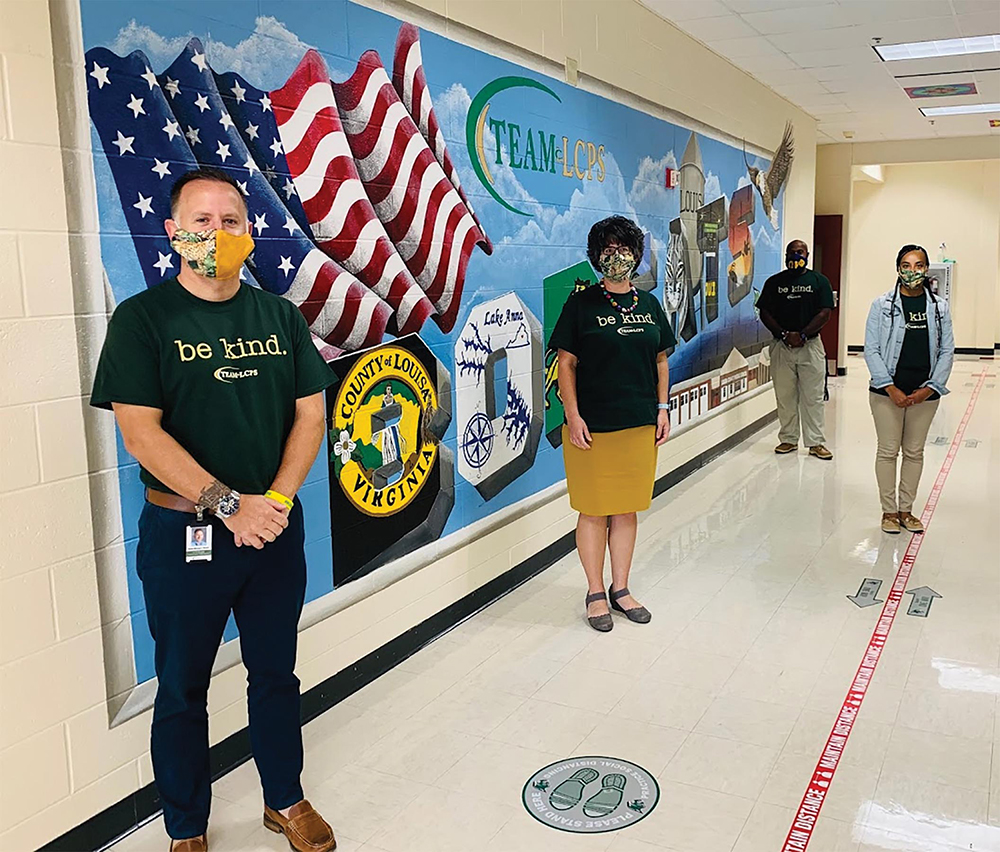
Beginning in foreground, Shaun-Michael Woody, Louisa County Middle School principal and Prosper co-leader, is pictured with assistant principals Amanda Harper, Christy Grigg, and Robert Morgan III. Woody became the school’s principal in the fall of 2020 (submitted photo).
By Olivia Bridges
When it comes to raising kids, people say “it takes a village.” In Louisa County, the ever so familiar trope is more than a metaphor; the Louisa Families Prosper grant program has garnered a village of support to help area youth develop impactful life skills.
The program targets community members, ages 10 through 14, to participate in hands-on, experiential learning. Through a series of seminars, participants are taught how to set goals, avoid peer-pressure, develop communication skills, and build healthy familial relations.
The implementation of the program is a two-fold approach. The communities involved with Prosper participate in one family and one school evidence-based program of their choosing. The first phase of the program is community-oriented, run by the 4-H youth development program in conjunction with Virginia Tech and Virginia State University. For the first two years of the program, 4-H worked on implementing a seven-week Strengthening Families Seminar that targets 6th graders.
The seminar is split up into two hours. During the first hour, parents and children are separated to work on different skills. Parents are taught communication and parenting skills through videos and discussions. The youth do more hands-on activities such as making family trees. Prosper team leader Lisa Ferrell said activities like this are intended to “get them in a frame of mind, thinking about people other than themselves and people that are in their group, in their bubble that are important to them and how they can communicate.”
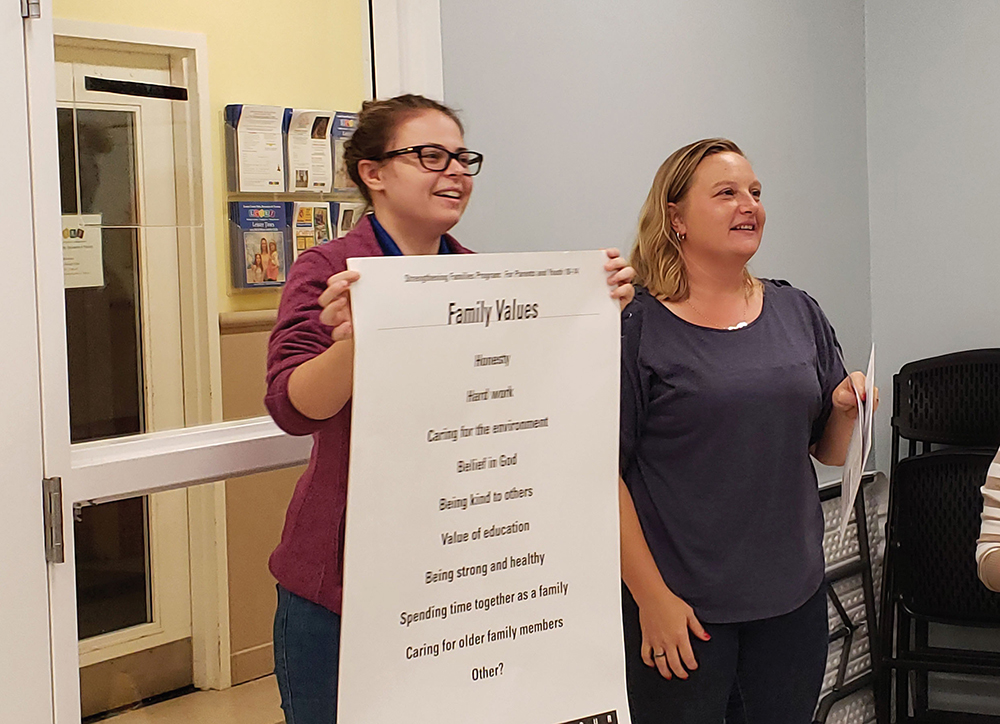
Bridgitte Groome (left) and Stephanie Bowman hold up a list of family values. The youth and their parents/guardians chose values to include in their family shield that reflect their values as a family (submitted photo).
The group reconvenes during the second hour. The gathering is intended to serve as a family meeting. Together, they would discuss their core family values, set goals, and do perspective-taking exercises. The families are also assigned tasks to practice at home.
“The parents had to practice ‘I’ statements, where they said: ‘I feel this way,’” Ferrell said. “[Parents] say: ‘you are not doing this right’ or ‘you need to do this better,’ and the ‘I’ statement takes it off of the youth and makes it more obvious that [parents] are talking about how [they] feel as the adult.”
“[‘I’ statements] definitely helped the parents and the youth in their communication with each other.”
Jennifer Thompson, 4-H unit coordinator extension agent, also discussed the impact of “I” statements and how they “helped with the de-escalation of arguments.”
“[‘I’ statements] definitely helped the parents and the youth in their communication with each other,” she said. “It helped the youth understand where their parents were coming from. That they’re not just always trying to come down on them; maybe they had a really busy day at work.”
In addition to strengthening parenting skills and building family relationships, the curriculum is also designed to prevent substance abuse and other behavioral problems. The program has several benefits for adolescents including increasing resistance to peer pressure, developing coping mechanisms for dealing with stress, reducing meth use, and combatting the early onset of substance abuse.
While the program is now into its third year, the pandemic has postponed the program’s original timeline. During the program’s second set of seminars, 4-H had to stop in-person events to prevent the spread of COVID-19 after the first session.
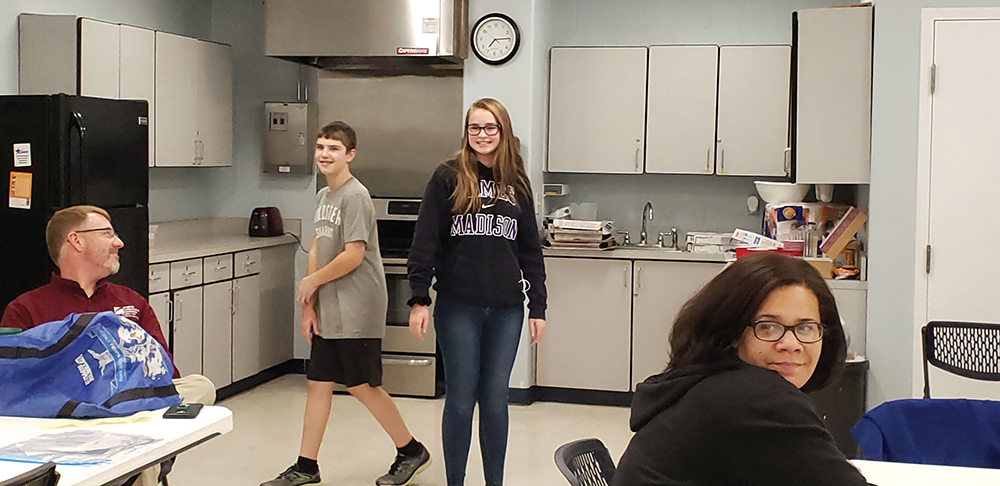
Youth participants and their parents/guardians attended the fall 2019 Strengthening Families Seminar at the Betty Queen Center in Louisa County (submitted photo).
“We are pivoting and looking at doing an online program, and there are certain counties across the country that are implementing it very successfully online,” said Ferrell. When the program returns, she said it is unclear if they will continue working with the families from the second seminar or if they will recruit new families.
The families involved in the program were found with the help of Ferrell’s co-leader Shaun-Michael Woody, who is the principal of Louisa County Middle School. Recruitment efforts include sending students a flyer with information about the family program when they receive their class schedule. Ferrell and her team would also go to back-to-school nights and rely on the school’s guidance counselors.
“The program has been shown to be helpful across all risk groups, so we are not just looking for people who are more high risk,” said Ferrell. “We work with the guidance counselors, and a lot of the time they will say, ‘Hey, we know we’ve heard you saying this or saying that, and we think there is a great program that would help you.’”
The next phase of the program – BOTVIN LifeSkills Training (LST) – has also been impacted by the pandemic. Louisa County Middle School planned on starting this program with 7th graders during their physical education and health classes beginning in mid-February. The curriculum will be taught over the course of 15 lessons. Due to COVID-19, health teachers will only see their students once a week.
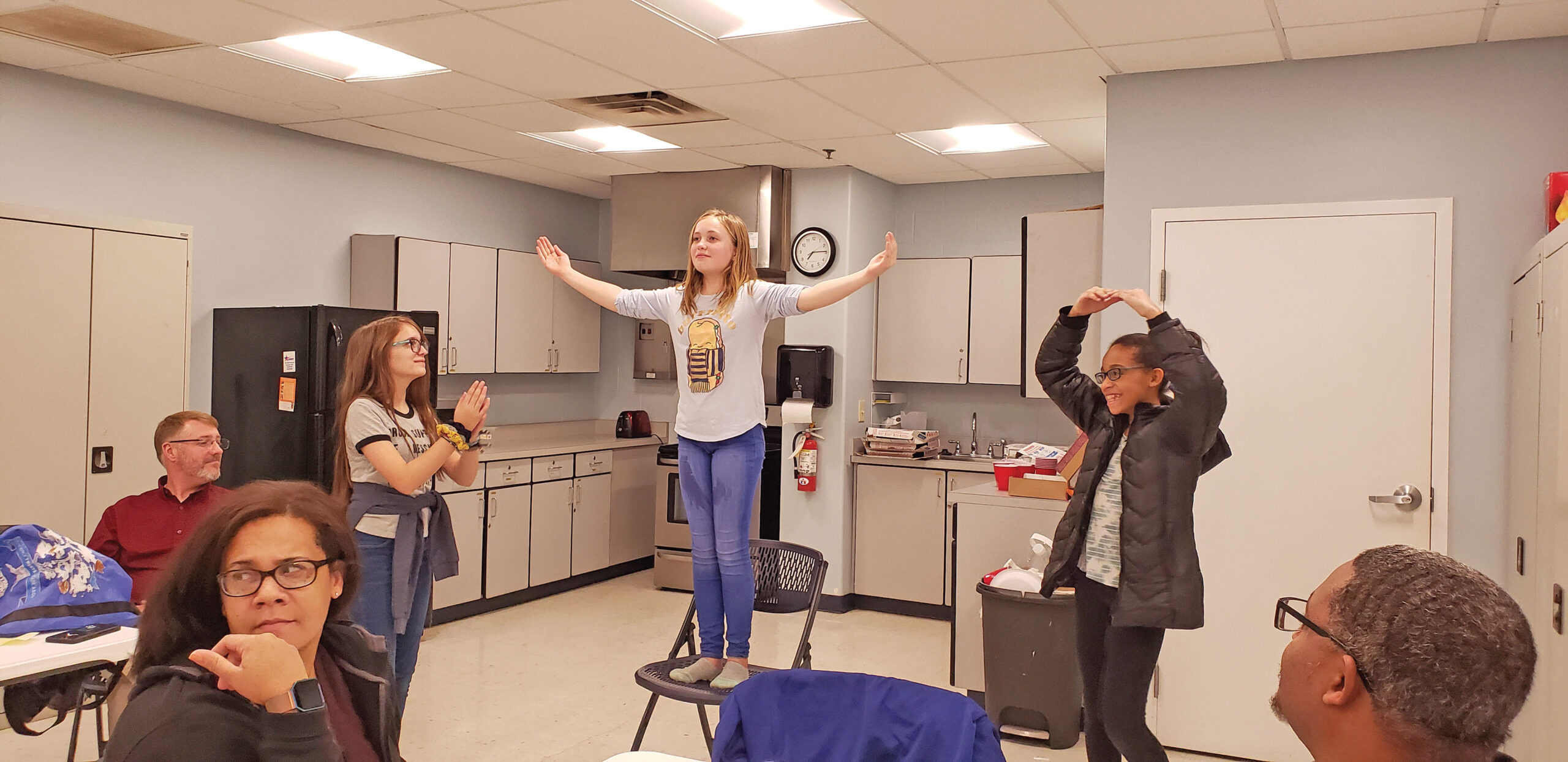
Youth participants Maggie, Gigi, and Kristen act out their belief in God. Maggie – who is standing on a chair – represents an angel while Gigi and Kristen demonstrate family worship as part of the activity (submitted photo).
“There really are three umbrellas for this program,” Woody explained. “One would be self-management skills, in reference to coping skills, problem solving skills, dealing with stress, dealing with anxiety.”
The second umbrella works with developing social skills and communicating effectively. Woody continued to say part of the social skill aspect is the “relationship-building process, making sure we are building those fruitful and positive relationships.”
The third aspect relates to substance abuse such as drinking alcohol and smoking. Woody also touched on the dangers of vaping, which has been on the rise with youth. The LST program has proven results that indicate it can delay and reduce the use of substances. According to the Prosper Partnership website, the training reduces the use of tobacco by 87 percent. Alcohol and marijuana usage also decreases by 75 percent. Additionally, students show a decrease in aggressive behavior.
Prior to the start of the program, the physical education and health teachers participated in training sessions, which were moved online as a social distancing measure. Teachers were provided comprehensive teacher’s manuals, student guides, smoking and biofeedback DVDs, and stress management DVDs.
“We did this LifeSkill training several years back, and it was great,” said Terry Marks, who teaches physical education and health at Louisa County Middle School. “We are going to be resuming this training via modules online on [January] 28, and it’s a seven-hour training session.”
According to Marks, the teachers will complete a module and then have a dialogue with the presenters before moving onto the next module. Marks spoke about how she hopes the program will help students think through important moments in their lives without making snap decisions.
“Life skills, you know, are not seven hours. It’s an ongoing adventure, especially when you’re speaking to 6th, 7th, and 8th graders,” she said. “If we can get one kid – and this is me – if I can get one kid to break out of that circle of dysfunction in that family, then my life is good.”
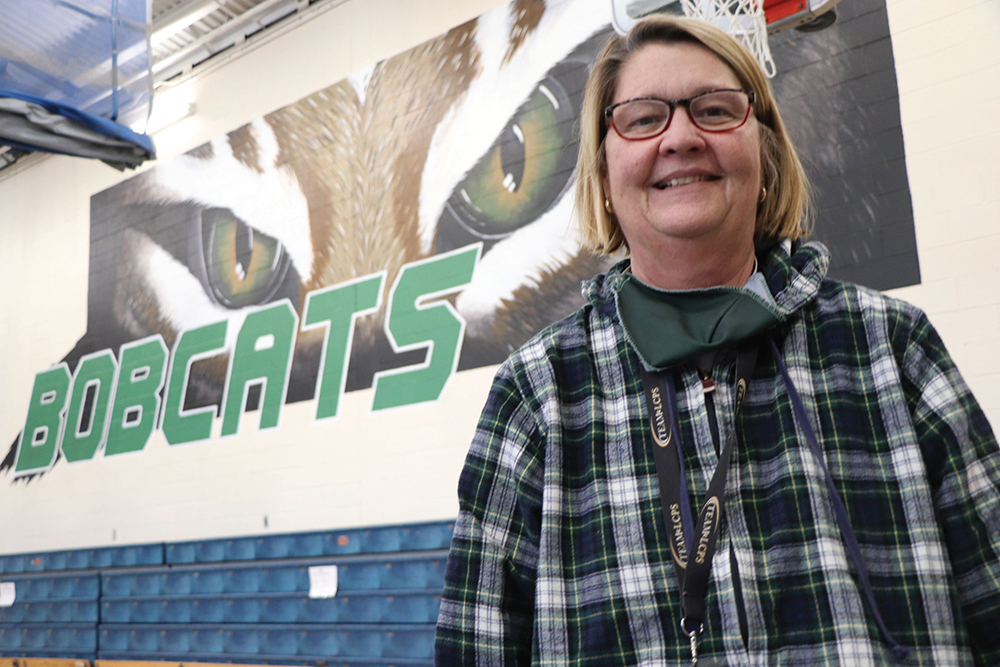
Physical education and health teacher Terry Marks planned to start implementing the LifeSkills Training curriculum in seventh grade Louisa County classrooms in mid-February (submitted photo).
While Louisa County is only entering its third year of the program, the Prosper program began as an evaluation study in 2001 and is now in its third continuation. The study began in Iowa and Pennsylvania and collected data from 11,000 participants. The program has since expanded, and the members of Louisa County will be included in the continual research, contributing to the evidence-based results.
“Part of the way we ensure that the evidence-based program is continuing to be successful is at the beginning of the seven week seminar and at the end of the seven week seminar, there are different surveys that [families] fill out, both the parents and the youth,” said Ferrell.
One of the results of the long-term study is that researchers discovered a significant reduction in lifetime prescription drug use. Researchers found that by age 21, 9.3 percent of the control group abused prescription drugs compared to 1.2 percent of those exposed to the independent variable, the family program. By age 25, the control group saw an increase of drug use to 15.5 percent, while the family program group only increased to 5.4 percent.
The probability that the correlation between the decrease in drug use and the family program is a result of chance, or the p-value, was p<.001. For the results to be statistically significant, the p-value has to be smaller than .05. The statistically significant results means that researchers could rule out the possibility that the program has no effect on drug usage. This suggests there is a causal relationship between a decrease in drug use and the Prosper program.
The benefits of the program extend beyond adolescents; parents and caregivers have reported positive outcomes as well. With the aid of the program, parents and caregivers are able to learn how to appropriately show affection and support for their children. Ferrell notes families are already reporting that they are using the skills they learned after the conclusion of the seminars.
Ferell said she hopes the program remains even after the federal grant funding ends. The grant provides funds to the program for five years. With two years left, Ferrell is already considering alternatives for funding. Ferrell and her team have discussed funding opportunities with Louisa County administrators and local businesses.
“A big part of the program is the community team, which I get 10 people from the community – including two youth ambassadors – and we meet and we talk about ways to help implement the program, help market the program,” said Ferrell. “We have to come up with the funding to continue the program, so they are part of that implementation.”
Most communities who participated in the five-year grant program were able to sustain Prosper for at least 11 years. The funding communities raised were able to provide resources for both the community and school-based operations.
For more information about getting involved in this program, call Lisa Ferrell at 540-967-3422.
Articles

RuraLove Ministries
This truck is filled with donations, some that have been picked and some to be delivered (submitted photo).by Kate Seltzer Four years before she could retire, Coral Losinski knew that she wanted to spend her retirement working at RuraLove’s thrift store. She...
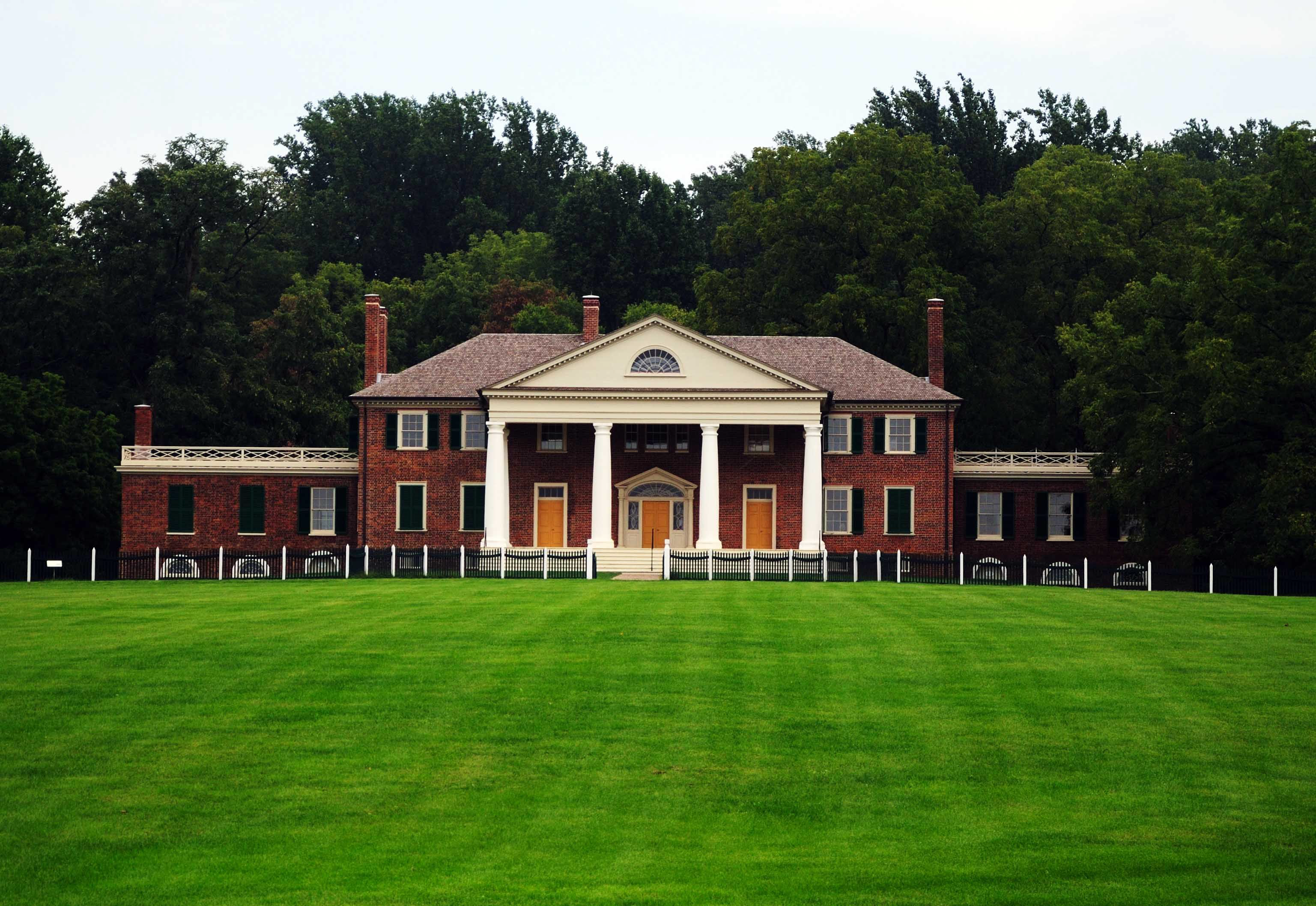
Tracking Lake Anna’s History County by County
Montpelier, located in Orange County, is the family home of James and Dolley Madison. Madison was the fourth president of the United States and the third to hail from Virginia. The home is open for tours on Saturdays and Sundays with more information available on...

